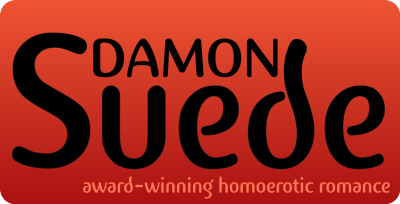An Ode to Gordon Merrick
by Damon Suede
The first gay romance I ever read was not an M/M novel... That particular beast did not exist back in the hideous dawn of the 1980s. And since it was the decade of excess and we're talking about romance novels, I found it because of a glorious, tacky, oil-painted cover... only this particular cover featured two impossibly hot, buff, preppy guys gazing longingly into each other's classic profiles. Through a million subtle signals (stylized poses, idealized models, saturated colors, florid title, the longing gesture, the gayest gaze), the painting identified the book inside as a romance but it was obviously about two dudes. "The famous bestseller of men in love." Unequivocal, daylit, speaking-its-name, if-you-don't-like-it-you-can-fuck-off GAY men.
Sh'yeaahh!
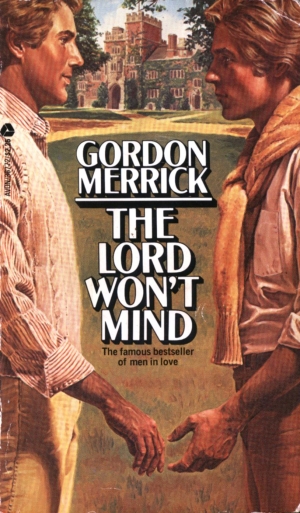 The Lord Won't Mind
was the title and I found it at Northwest Mall in Houston, Texas
circa 1983-or-4 ... (heaven help us all). I didn't know it at the time, but the edition
was a fat glossy Avon reprint of an unlikely runaway bestseller (16
weeks on the New York Times list back in 1970) timed perfectly for the heyday of
the post-Stonewall Gay Lib movement. The author was Gordon
Merrick and when I picked it up I knew what it was immediately,
just as I was supposed to: this was a homoerotic romance for a wide audience
that knew all about judging books by covers.
The Lord Won't Mind
was the title and I found it at Northwest Mall in Houston, Texas
circa 1983-or-4 ... (heaven help us all). I didn't know it at the time, but the edition
was a fat glossy Avon reprint of an unlikely runaway bestseller (16
weeks on the New York Times list back in 1970) timed perfectly for the heyday of
the post-Stonewall Gay Lib movement. The author was Gordon
Merrick and when I picked it up I knew what it was immediately,
just as I was supposed to: this was a homoerotic romance for a wide audience
that knew all about judging books by covers.
How a paperback copy wound up on that shelf in General Fiction in B.Dalton in a grubby mall in north Houston in the early eighties, I'll never know. A distributor mistake? A gay clerk? An unclaimed special order for a closeted rancher? It didn't matter, but I was deeply grateful in my queer-teen heart. I bought it immediately, took it to a skeezy food court and literally read the entire thing cover to cover in about 3 hours.
Before I explain further, a little context would help here...
As fate would have it, 1983-or-4 was the year that romance novels had out-and-out exploded as a genre, taking publishing and the world by storm. Romance was a zeitgeist phenomenon. This breakout genre had climbed onto the news and into people's purses: clinch covers and step-backs. V.C. Andrews was hot-hot hot with the tween girls in my class... and those were just pubertal gothics (though I wouldn't suss that for a couple more years). Hell, they were reprinting 10-year-old gay romances with expensive painted covers and selling them in Texas malls. Obviously romance had arrived.
Moreover, I was in Houston. That's weirdly important too. Though I did not know it, in 1980 a group of prescient women a couple miles from the ranch where I grew up had formed what would become the Romance Writers of America about a 10-minute drive from the mall where Gordon Merrick found me a few years later. Fate is a joker. 29 years later this same organization would authorize a special interest chapter, "Rainbow Romance Writers," for people writing LBGT romances. And in 2015, I would be appointed to serve on the RWA National Board under a directive to increase diversity and inclusion within the organization. Lord the years they do roll 'round! But sitting there as a kid, reading Gordon Merrick's purple prose, I didn't know any of that yet. I just felt like I'd struck the guilty pleasure motherload.
 I was a hyperverbal adolescent at the time. By this point in the early 80s and my early teens, I'd read a couple
vanilla romances
myself, I'd always been a voracious reader, like a woodchipper
really, and there were always a couple lying around my mother's
house, southern feminist though she was. Again, America had been
bitten by the romance bug so they were just... everywhere. Run
out of stuff to read in the 1980s and eventually you picked up a book with
Fabio
windblown on the cover. I'd known I was gay from about the
age of 7, so it wasn't like I was worried about being pegged as
girly. I passed for straight easily, even after I came out in high
school, so if I wanted to read a cheeseball, clinch-covered
romance I was gonna.
I was a hyperverbal adolescent at the time. By this point in the early 80s and my early teens, I'd read a couple
vanilla romances
myself, I'd always been a voracious reader, like a woodchipper
really, and there were always a couple lying around my mother's
house, southern feminist though she was. Again, America had been
bitten by the romance bug so they were just... everywhere. Run
out of stuff to read in the 1980s and eventually you picked up a book with
Fabio
windblown on the cover. I'd known I was gay from about the
age of 7, so it wasn't like I was worried about being pegged as
girly. I passed for straight easily, even after I came out in high
school, so if I wanted to read a cheeseball, clinch-covered
romance I was gonna.
Having literally read everything I could get my hands on, it was inevitable that I'd wind up having a go at Flame and the Flower or some lurid descendant of it. I loved the passion and adventure and tenderness of them. At the time, I was starting to write myself and I was particularly fascinated by genre structure (weird, right?) so I already owned copies of Kathryn Falk's wildly popular guide to writing romance and The Romance Writer's Phrase Book. I still own both those books over 20 years later. Freaky. But I had NO IDEA that there was such a thing as a gay romance until I picked up Gordon Merrick's The Lord Won't Mind.
Holding Merrick's queer pulp classic in my hand, I knew it was not "worthy" literature, not a coming-out novel, not a coming of age story: full-on homo romance with hot boning. I'd thought lusty, hard-handed men ravishing pliant heroines was plenty sexy enough for me, certainly... but two men ravishing each other?! "Hell, yeah!" I thought, totally sucked in by the frank desire of the painting. What I craved at 12 or 13, you see, was the intimacy between men. Not the fucking, not the camp, not the spectacular excess, not the raw psychologized truth, but the tenderness. I liked naked dudes just fine, but what fascinated me was the closeness I wanted to feel myself, so I was ripe for the romantic plucking. In the bad old days before the world-wide-wet-dream and "It Gets Better," this was better than porn.
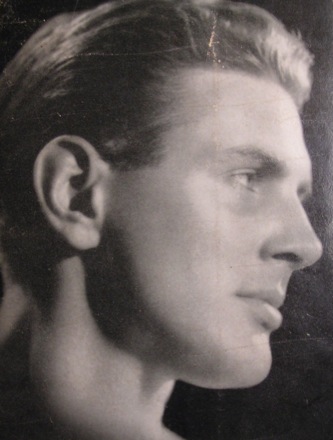 Now, I wouldn't discover it for many years but in the
gay-chic 1970s,
Gordon Merrick had been a sensation and
something of a miracle to boot. Classically
handsome and alluring as one of his own heroes, wealthy and
celebrated to a shocking degree. He had lived a
charmed, glamorous life as a trust-fundie, actor, arm-candy, journalist, and...
wait for it...
SPY before
becoming a gay romance author, and his books held some of that
sizzle and shimmer. What do rich, gorgeous, homosexual former-thespian-espionagers dream about?
Well, here it was... The stories didn't feel real in
any way, but the intense
feelings felt real, if that makes
sense. As if the heated, obsessive, frantic quality in the
characters came from a real
place in him and his wild life.
Now, I wouldn't discover it for many years but in the
gay-chic 1970s,
Gordon Merrick had been a sensation and
something of a miracle to boot. Classically
handsome and alluring as one of his own heroes, wealthy and
celebrated to a shocking degree. He had lived a
charmed, glamorous life as a trust-fundie, actor, arm-candy, journalist, and...
wait for it...
SPY before
becoming a gay romance author, and his books held some of that
sizzle and shimmer. What do rich, gorgeous, homosexual former-thespian-espionagers dream about?
Well, here it was... The stories didn't feel real in
any way, but the intense
feelings felt real, if that makes
sense. As if the heated, obsessive, frantic quality in the
characters came from a real
place in him and his wild life.
In a fluke of publishing history, Merrick had managed to publish a mass-market gay romance at exactly the moment when "butch" gays were making waves and AIDS hadn't yet made us scary/tragic/toxic in the media the way it would by the end of the 80s. During the me-decade, America had just "gotten" the idea of manly men who wanted other manly men and Gordon Merrick gave it to them with both fucking barrels and a slap on the ass. He just went for it and kept right on going. Taste and discretion be damned! Full on, trashy, splashy liberated homo-romance. Sexy and sweet and (to be frank) sadistic in its use of stereotypes and self-hating language. But none of that mattered one whit.
Sitting in that mall in 1983-or-4, tearing through Merrick's romantic bestseller, I didn't know that The Lord Won't Mind had been an unlikely smash-hit, assuring him an outlet for further-and-franker outings. Imagine that: mid1970s, a gorgeous gay bon-vivant and scion of a wealthy family cranks out a string of erotic man-romances that make piles of cash as mass-market bestsellers. A brilliant (gay) cover artist named Victor Gadino was to paint a series of lush, louche covers for the 1980s reprints that were every bit as sexy and sullen as the characters in Merrick's books. As in Merrick's fiction, Gadino included tiny tactile specifics (veins, creases, tan lines, stubble, wrinkles, stains) in the paintings that made their impossible idealism seem less ridiculous. His smoldering palettes and hyper-real brushwork could not have been a better match for the novels they depicted.
Crazy, right?!
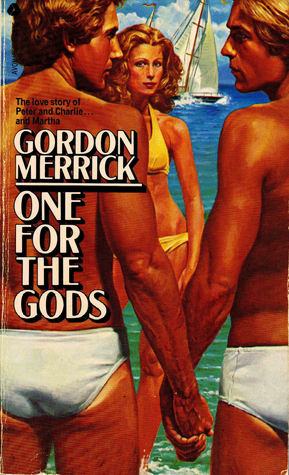 I
couldn't know any of that back then, sitting in that food
court with a bone in my pants and a tingle in my gut. But Lord,
I fell into the obsessive, destructive relationship at the
book's core, sucked in and held down... drowning in phallus and
pathos. Queer delirium. I loathed both the main characters but I loved them too, the way you
do. Even as a literal virgin in every sense of the
word, I knew the sex was preposterous and florid. When I'd finished and gone home and read it again, I read
the back cover and found out Charlie and Peter had a series
even! Plus, there were more
books, single titles and series both. The next week or so, I
reread that book 10, 15, 25 times until Gordon Merrick became an
obsession and I decided to track down all of the books.
Literally, every book the man had written. But how?! I was
determined to get
them, to find them, to pursue them with the relentless bibliolust of
pubescent gay Gollum.
I
couldn't know any of that back then, sitting in that food
court with a bone in my pants and a tingle in my gut. But Lord,
I fell into the obsessive, destructive relationship at the
book's core, sucked in and held down... drowning in phallus and
pathos. Queer delirium. I loathed both the main characters but I loved them too, the way you
do. Even as a literal virgin in every sense of the
word, I knew the sex was preposterous and florid. When I'd finished and gone home and read it again, I read
the back cover and found out Charlie and Peter had a series
even! Plus, there were more
books, single titles and series both. The next week or so, I
reread that book 10, 15, 25 times until Gordon Merrick became an
obsession and I decided to track down all of the books.
Literally, every book the man had written. But how?! I was
determined to get
them, to find them, to pursue them with the relentless bibliolust of
pubescent gay Gollum.
Remember... this was pre-internet in deep Texas and I was a kid. Used books were something you found one at a time by chance. Chain stores stocked titles based on availability and interest... Gay romances, not so much. Hoarding birthday money and my allowance, I scoured the bookstores in Houston for months. I couldn't exactly call and ask for these homoerotic epics at my age, so I went looking, checking every title on every shelf of every store in the fourth largest city in the USA. Every time I could manage to get myself to any bookstore where I could steal an hour to myself to hunt the inventory without any prying homophobic eyes.
FINALLY, one rainy afternoon, I struck gay-romance gold in the Galleria (of all places), the massive expensive multi-mall at the heart of Houston's upscale shopping district. Down in the basement, next to (I kid you not) a magic store selling sword tricks and flash paper, was a sprawling establishment called the Sam Houston Bookstore with funkier stock than the national chains. The sassy women behind the counter wore art-teacher jewelry and left you to shop without nagging or hovering. I never thought of this place as a source for fiction; they offered more coffee-table books and populist histories of Lone Star monuments, but I was running out of places to dig and the clerks were fruit-fly groovy... I was doing my usual scour and suddenly (next to a spinning rack of Harlequins) discovered literally every single goddamned glorious title ever written by Mr. Merrick in heaps on one lurid, jewel-toned display rack... a gleaming mint-condition column of ripped-sullen-studly homos flirting with each other in languorous, iconic, oil-painted beauty for my edification and derangement.
Jackpot.

If I ever I had doubted my sexuality, that was the moment I knew that I was gay; the impossible joy of finding those books meant I had to be really, truly, unequivocally a homosexual. Their unapologetic queerness rang in me like a consonant bell.
I almost passed out with triumph. But then... I realized
I, as a 12 or 13 year old, had to figure out how to buy all
eight or ten of them without anyone freaking out. I knew my mom
wouldn't give a shit because I was always reading the oddest things,
but the clerks might raise a ruckus to "protect" me.
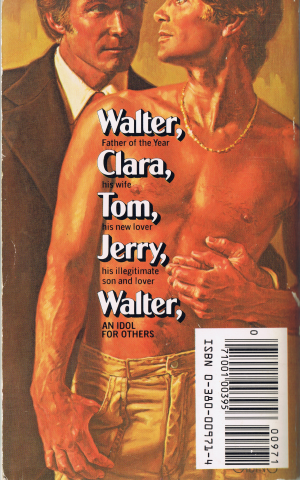 I fought an unbelievable
battle with myself standing down in the Galleria basement in front of
all those racy
covers. Did I have the changs? Was I really going to blow that
much cash for a stack of romance novels? What if the sales staff
balked at selling such shameless gaybait pulp to a precocious
adolescent? If I could decode the homo-romance covers, surely
they would. My literary addiction won. I just bit my
tongue, made a tottering pile held stable by my peach-fuzzed chin and carried
it to the counter. I would just bluff my way through any
protests.
I fought an unbelievable
battle with myself standing down in the Galleria basement in front of
all those racy
covers. Did I have the changs? Was I really going to blow that
much cash for a stack of romance novels? What if the sales staff
balked at selling such shameless gaybait pulp to a precocious
adolescent? If I could decode the homo-romance covers, surely
they would. My literary addiction won. I just bit my
tongue, made a tottering pile held stable by my peach-fuzzed chin and carried
it to the counter. I would just bluff my way through any
protests.
I plunked them down and the middle-aged Latina began ringing me up without blinking an eye. It was a LOT of books, and I was just a gangly kid. I waited for the interrogation, the refusal, the moral outrage, the screechy gay-shaming... My heart was in my throat. Nothing. For all I know, she didn't notice anything but the ISBN strip and was psyched to make such a big, honking sale on a drizzly day; she totaled me up and I paid gladly the $60 or $70 it cost and hauled my heap of homoerotic booty back to the family car feeling like I'd won the lottery. Once home I organized them chronologically and then rationed them like wartime sugar, tracing and retracing the byzantine plots and hormonal hunks. I devoured them slowly and carefully...rolling around in the frantic, florid world that Merrick had woven out of his supercharged fantasies.
The books were flat-out insane.
Like Judith Krantz and Rosemary Rogers, Gordon Merrick was more Euripides than Austen. These books went beyond smutty excess with a kind of purposive frenzy. Anything volatile was fair game: seduction and abuse and promiscuity and jealousy and drugs and assault and adultery and bondage and betrayal and rape and revenge and self-destructive, spoiled protagonists at every turn. Everyone impossibly gorgeous and fabulously wealthy and tortured/talented beyond belief. Yachts and Picassos and trust funds and exotic ports of call. Society weddings and perverse scandal. Sexual compulsion ad ridiculo. Cocks like wine bottles and earthshattering kisses and bodies carved from warm marble. International intrigue slammed up against mindbending cuddly schmaltz. Fabulous careers and public triumphs to contrast the endless private anguish suffocating these bright young studs. Plus, a freaky preponderance of manly closet-case heroes who wrecked everyone they touched, carrying poison in their massive stingers like unwitting scorpions. But invariably, each couple's Happily Ever After glimmered in the impossible distance: an eternally randy unicorn.
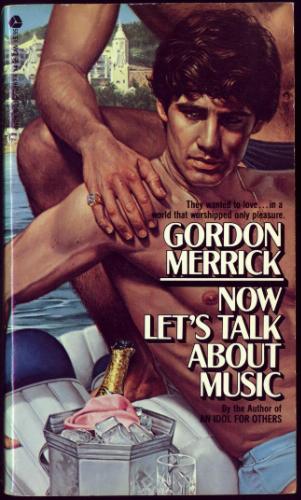 These
novels were not M/M at all.
They weren't porn either, though the sexual content was
mind-boggling. They weren't much more than pulpy airport novels,
which is probably why they're still so ignored by gay lit-crit types.
They were close cousin to all of the above. Nowadays we might call them flat-out erotic
romance, and they were close queer kin to Krantz's shopping-n-fucking
sagas like Scruples and
Mistral's Daughter: Cock and cash über
alles... Protagonist as consumer, plot as pricetag.
Everything writhed between the lines. These were books by a gay man
for other gay men and they enshrined many of his prejudices and
anxieties and fantasies.
These
novels were not M/M at all.
They weren't porn either, though the sexual content was
mind-boggling. They weren't much more than pulpy airport novels,
which is probably why they're still so ignored by gay lit-crit types.
They were close cousin to all of the above. Nowadays we might call them flat-out erotic
romance, and they were close queer kin to Krantz's shopping-n-fucking
sagas like Scruples and
Mistral's Daughter: Cock and cash über
alles... Protagonist as consumer, plot as pricetag.
Everything writhed between the lines. These were books by a gay man
for other gay men and they enshrined many of his prejudices and
anxieties and fantasies.
Even now, I could probably tell you what interested Gordon Merrick, the glamor he cultivated, the wit that tickled him, the friends he enjoyed, the parties he threw, the regions that charmed him, the kinds of men he pursued, the flavors of porn that waxed his axe. Remember, these books were fiercely unapologetic about a lifestyle that most Americans still viewed as a sin, a mental illness, and a crime. Yet for all their demented hyperbole, they hid a strange sliver of truth and a kind of valor: maybe it was just the pain of a fabulous gay man who'd made an unlikely path at the worst of times...
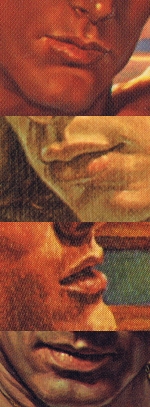 In 1984-or-5,
when I was still young, and I was first reading (and
rereading) the books I noticed something about the
Victor
Gadino artwork
that was more important than I'd realized. I figured out why the covers had made me so certain
in a moment's glance that they were romances about
gay characters instead of homosocial bonding in hetero romance...
The visual clue was very subtle but it was conspicuous
in every painting. These stunning mesomorphic men were depicted with
hypermasculine athletic definition and granite jawlines, but on every classic
chiseled face the
artist had given them overlush, undeniably feminine lips. It was a
kind of code. You didn't notice it at first, but something about
the covers made these men look.... queer (in both senses of the
word). Stunning, but slightly off in a way that took scrutiny to
dissect.
In 1984-or-5,
when I was still young, and I was first reading (and
rereading) the books I noticed something about the
Victor
Gadino artwork
that was more important than I'd realized. I figured out why the covers had made me so certain
in a moment's glance that they were romances about
gay characters instead of homosocial bonding in hetero romance...
The visual clue was very subtle but it was conspicuous
in every painting. These stunning mesomorphic men were depicted with
hypermasculine athletic definition and granite jawlines, but on every classic
chiseled face the
artist had given them overlush, undeniably feminine lips. It was a
kind of code. You didn't notice it at first, but something about
the covers made these men look.... queer (in both senses of the
word). Stunning, but slightly off in a way that took scrutiny to
dissect.
That hidden visual code was very much a choice reflective of that moment in time: the 80s romance clinch covers are infamous and gorgeous in their way. Of course you'd give a gay hero in a romance a pouting feminine mouth on his cover: a willing orifice for the era of conspicuous consumption. You couldn't give him a heaving bosom or flowing tresses or a torn dress, but those ripe, glossy lips were just enough to tell a tale. It was even more noticeable if you compared their mouths to the tightlipped heroes depicted on hetero romance covers. It was the painter's ingenious wink to the knowing buyer... a coded message that gay folk knew how to interpret (as we always have and always will, I expect). As Vito Russo would have said, these books taught me not only that there WAS a secret tribal code, but how to decipher it. Literary gaydar!
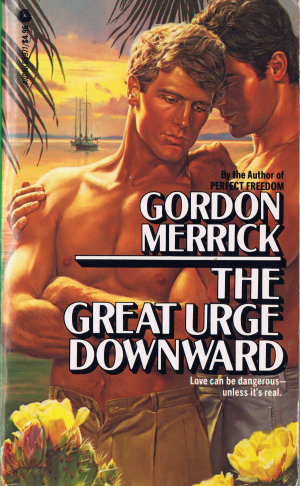 By the time I was 15 or 16, I had made my way
to NYC for the first time, hightailed it to
A Different Light,
and discovered a world of gay fiction that enriched me in ways
that still surprise me. I even found other homo-romances, which
were as different from Merrick's output as I could imagine. But it was Merrick who started it
for me:
politically incorrect and demented though his books were. They
were about bold, beautiful queer heroes who battled shame and
hypocrisy and always got their man. Now it seems like pulpy
junk, but in another era when people got blackballed and beaten
to death, his bravery smoked off the pages.
By the time I was 15 or 16, I had made my way
to NYC for the first time, hightailed it to
A Different Light,
and discovered a world of gay fiction that enriched me in ways
that still surprise me. I even found other homo-romances, which
were as different from Merrick's output as I could imagine. But it was Merrick who started it
for me:
politically incorrect and demented though his books were. They
were about bold, beautiful queer heroes who battled shame and
hypocrisy and always got their man. Now it seems like pulpy
junk, but in another era when people got blackballed and beaten
to death, his bravery smoked off the pages.
Oddly enough, Merrick continued to write books into the late 1980s, but he remained a creature of the prior decade: Gay Lib's Harold Robbins. The last Gordon Merrick romance came out when I was a freshman in college, and by that time, the covers had changed, and with them (and the advent of the new Plague) something else had shifted in the zeitgeist. The "homos" had gotten all butch and cloney for the 1970s, until the virus had slapped them "back down where they belonged" in the multimedia gutter of denial and clowndom.
As the 1990s loomed, Gay Liberation had been reforged into the shackles of Reagan-era hypocrisy and the cult of the underwear model. People didn't want to be artists and actors and authors anymore, they just wanted to be famous. Porn (and fears of disease) had transformed frank eroticism into assembly line "hotness" for mass production and universal consumption. The consuming excesses of the decade beggared Merrick's own fevered fantasies. A new Gilded Age sprung of laziness and prejudice was taking root. By the time Merrick passed away in 1988 (in Sri Lanka!) there wasn't actually room in mass market publishing for a gay novelist with such a romantic, fearless, hyperbolic view of the world.
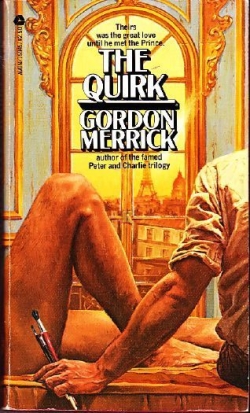 Those
Avon editions with their fabulous, suggestive
Victor Gadino covers
are out of print and very hard to find. Many of these paperbacks sell for
hundreds of dollars. Not surprising really... they were an
anomalous blip on the Thatcher/Reagan-era publishing landscape
and a rapid casualty of the AIDS epidemics affect on gay
visibility in the media. Translation: perfect eBay collectors item. I can't imagine millions of copies got
sold, and whatever did get sold wouldn't have been treated
gently. They were mass-market pulp for queers and fruit flies. I
wish they were still
in print with the saucy Avon covers and I'm
relieved they
aren't. They needed a warning label for the subtext! They were
fabulous but they were terrible too: poison candy.
Those
Avon editions with their fabulous, suggestive
Victor Gadino covers
are out of print and very hard to find. Many of these paperbacks sell for
hundreds of dollars. Not surprising really... they were an
anomalous blip on the Thatcher/Reagan-era publishing landscape
and a rapid casualty of the AIDS epidemics affect on gay
visibility in the media. Translation: perfect eBay collectors item. I can't imagine millions of copies got
sold, and whatever did get sold wouldn't have been treated
gently. They were mass-market pulp for queers and fruit flies. I
wish they were still
in print with the saucy Avon covers and I'm
relieved they
aren't. They needed a warning label for the subtext! They were
fabulous but they were terrible too: poison candy.
See... many years later, I went back and reread the Merrick novels and (even though I still loved the lunatic over-the-top romance) was appalled by the actual prose and a lot of the underlying detritus: the creepy politics, the gender stereotyping, the codependence and hysteria, the insidious misogyny, the vicious families, the abusive partnerships, the rigid roleplaying, the blithe materialism, the obsession with perfection that went beyond fantasy to the real body dysmorphia that still plagues the gay community to literal death. And central to every plot, every character arc, the evil, corrupting, compromising midcentury "Closet" looming like Godzilla irradiating their landscapes with toxic shame and doubt and pain.
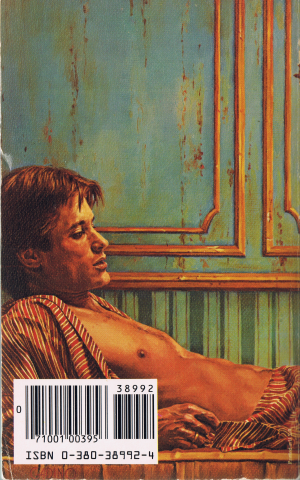 Sexy as Merrick's books are, there is something hopeless and claustrophobic
about all of the love stories. They are all effectively set in
gay ghettos, stifled and isolated from the world, kissing in shadows.
He couldn't imagine the possibility of proud couples welcome in
their own country. Pre-Stonewall anxiety dogs every plot point and drives almost all
his homo heroes into fabulous-but-geographically-remote sunsets. The Happy Endings
are
closed-in; the obsessive commitments verge on suffocation. If I didn't notice it in 1983, then perhaps it's
because claustrophobia was something I knew plenty about growing
up in the bible-belt as a "butch queer."
Sexy as Merrick's books are, there is something hopeless and claustrophobic
about all of the love stories. They are all effectively set in
gay ghettos, stifled and isolated from the world, kissing in shadows.
He couldn't imagine the possibility of proud couples welcome in
their own country. Pre-Stonewall anxiety dogs every plot point and drives almost all
his homo heroes into fabulous-but-geographically-remote sunsets. The Happy Endings
are
closed-in; the obsessive commitments verge on suffocation. If I didn't notice it in 1983, then perhaps it's
because claustrophobia was something I knew plenty about growing
up in the bible-belt as a "butch queer."
Rereading 25 years later, it didn't make me love them less, but it made me glad that I'm typing this in 2011. It made me so goddamned proud of the Romance Writers of America for creating and championing the Rainbow Romance Writers. It made me want to personally thank every member of the RRW for having the passion and the commitment to challenge the status quo in publishing's most successful genre. It really made me wish Gordon Merrick could have been a RRW member even posthumously. He would have loved that: his fleshy fantasies free to walk in the light outside of the gay ghetto for a world that wanted them desperately.
What his books offered, what they were, was an unlikely voice made loud. Twisted as they seemed, perverse as they were, they were a miracle. I'm sure that many, many thousands of gay men found pleasure and passion in their lurid excesses. But mass-market books must have been read by others too; just based on the volume of the print-runs there had to be a couple hundred thousand bold heteros taking a read on the wild side. Like modern LGBT romance, Gordon Merrick's fiction spoke to an unexpected fantasy that shook preconceptions in a sexy way. They aroused and rattled the romantic status quo. In that sense, they were exactly like M/M and slash for their era.
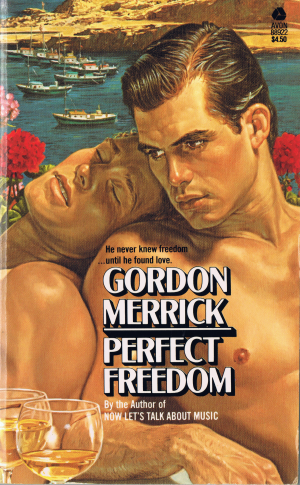 The world has cooled
considerably since then... and the cracked closet door has swung
open much further. The moron majority hasn't been able to hate
us out of existence. Thirty years on queers aren't actually so
queer anymore; we're part of the popular mainstream
landscape. Today a gay teen in the most rigid home
in the most bigoted community can find the same breed of erotic romance
online at
Nifty.org and similar smutty fiction sites free without scouring 300 stripmall bookstores a shelf at a
time. Our "ghettos" are acknowledged
as epicenters of culture and economic progress in every major
city on the planet. Gay marriage has evolved from a snotty joke
into an inevitability. We kiss in sunlight and even manage to
share a few of the rights with the bigots that wish us dead. Conglomerates and politicians market openly
to the gay dollar and the gay vote. We have television channels and professional
organizations and a legitimate social presence! It does get better and it has.
The world has cooled
considerably since then... and the cracked closet door has swung
open much further. The moron majority hasn't been able to hate
us out of existence. Thirty years on queers aren't actually so
queer anymore; we're part of the popular mainstream
landscape. Today a gay teen in the most rigid home
in the most bigoted community can find the same breed of erotic romance
online at
Nifty.org and similar smutty fiction sites free without scouring 300 stripmall bookstores a shelf at a
time. Our "ghettos" are acknowledged
as epicenters of culture and economic progress in every major
city on the planet. Gay marriage has evolved from a snotty joke
into an inevitability. We kiss in sunlight and even manage to
share a few of the rights with the bigots that wish us dead. Conglomerates and politicians market openly
to the gay dollar and the gay vote. We have television channels and professional
organizations and a legitimate social presence! It does get better and it has.
I just want to remember Gordon Merrick and raise my glass, to honor his courage and audacity... for literally making his life into a sexy, romantic, unapologetic dream and then giving the dream back so that other less beautiful, talented, wealthy kids could hang on while the world caught up with them.

ETA: I've just been contacted by Open Road Media about their rerelease of Merrick's body of work in ebook (with the exception of Measure of Madness and Strumpet Wind). If you're interested, here are links to the new ebooks on their site:
- The Lord Won't Mind (Peter & Charlie Trilogy, Book 1)
- One for the Gods (Peter & Charlie Trilogy, Book 2)
- Forth into Light (Peter & Charlie Trilogy, Book 3)
- Now Let's Talk About Music
- The Quirk
- An Idol for Others
- Perfect Freedom
- The Great Urge Downward (sequel to Perfect Freedom)
- The Good Life (co-written by Merrick with his lover Charles Hulse and published posthumously)
